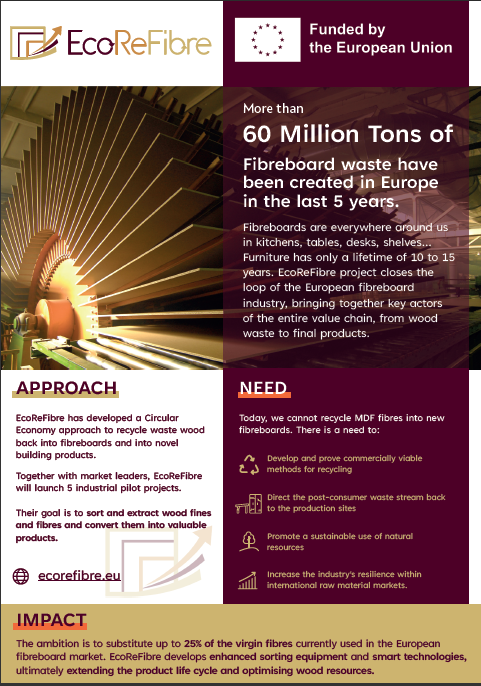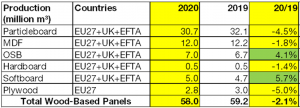Advancements in building at both height and scale in engineered timber has understandably drawn attention to the potential of new build in wood to store carbon is a significant necessity in the battle against climate change. Switching to wood on a wider scale can help bring emissions down as trees naturally sequester CO2 from the atmosphere and the carbon is then stored in the wood.
This potential lay behind Commission President von der Leyen observation in her speech to the European Parliament in September 2020 where she stated, We know that the construction sector can even be turned from a carbon source into a carbon sink, if organic building materials like wood are applied.
What has received less attention is the potential of the Renovation Wave to store carbon and likewise make a similar contribution to tackling climate change.
Organised by the European Confederation of Woodworking Industries (CEI-Bois), the European Organisation of the Sawmill Industry (EOS) and the European Panel Federation (EPF) the Club du Bois met online on 27th May to consider the potential of the Renovation Wave to store carbon.
During the meeting the European Woodworking Industries called upon policy makers to:
- Acknowledge the benefit of stored carbon at product level: such benefit should be quantified and incentivised by using the right tools such as Environmental Performance Declarations for construction products. EPDs should be established as the harmonised reference tool for assessing the environmental footprint of construction product within the revision of the Construction Products Regulation.
- Acknowledge the climate benefit of wood at a building level: there is a need to move beyond the energy performance metrics. The revision of the Energy Performance of Buildings Directive (EPBD) offers the opportunity to introduce requirements to report and reduce the emissions of a building over the entire lifecycle, including manufacture, transport, construction, use and demolition.
- Develop appropriate digital tools for carbon accounting: there is a need to empower consumers and professionals to make the right sustainable choices in construction and renovation through digitalization. Incentivising Digital Design and Building Information Modelling (BIM) will make it possible to calculate the climate benefit and show architects and consumers the climate impact of longer life and designing for re-use and recycling.
Such measures would result in less CO2 being emitted AND a bigger carbon sink being created which taken together would result in much less CO2 in the atmosphere.
Addressing the meeting Simona Bonafè MEP chair of the Club du Bois noted: Wooden construction materials can provide renewable alternatives to fossil-based and carbon intensive materials while replanting and sustainable forest management ensures that forests resources are not depleted. In this way constructions in timber are a key building block of the European circular bioeconomy bringing sustainable jobs in both urban and rural areas and reducing the carbon footprint of the buildings.
At the same time, it has become increasingly clear that renovation in wood also has the potential to store carbon and today’s meeting explores these benefits. This is a good opportunity to discuss why the renovation wave should recognise the potential of the existing European housing stock to become a new carbon sink.
While Eero Heinaluoma MEP stated “Investments into wood-based products are needed as they promote sustainability and reduce emissions when replacing fossil-based products. The Commission needs to consider ways to account for wood products alongside forests as a means for increasing the forest sink”.
The meeting noted the important work of Professor Schellnhuber of the Potsdam Institute for Climate Impact Research in promoting the storage of carbon within the built environment work which has had a major influence on President von der Leyen’s thinking including on the development of her New European Bauhaus initiative, with its emphasis on sustainability, beauty and affordability, all criteria that wood can help deliver.
The meeting was of the view that 2 to 6 tonnes of CO2 equivalent could be stored in wood products in each dwelling being renovated, while also reducing the emissions over the lifecycle of the building.
In the Q&A session between MEPs and industrialists there was an acknowledgment of the clear ability of the built environment to deliver additional carbon storage and thus considerable interest in the potential for a European carbon credits system to promote and even incentivise the use of wood and wood-based products. It is understood that the European Commission’s DG CLIMA is working on such a proposal, and the outcome of this is eagerly awaited.
End.
|
The European Panel Federation (EPF) represents the manufacturers of wood-based panels being particleboard, dry process fibreboard (MDF), oriented strand board (OSB), hardboard, softboard and plywood. EPF has members in 32 European countries. The EU wood panel industry creates over 100,000 jobs directly and counts more than 5,000 enterprises in Europe. www.europanels.org |
|
CEI-Bois is the European Confederation of the Woodworking Industries. It represents 22 European and National organisations from 16 countries and is the body backing the interests of the whole industrial European wood sector. www.cei-bois.org |
|
The European Organisation of the Sawmill Industry (EOS) represents some 35,000 sawmills manufacturing sawn boards, timber frames, glulam, decking, flooring, joinery, fencing and several other wood products. EOS represents around 80% of the total European sawn wood output in a sector that has a turnover of around 35 billion EUR and employs about 250,000 people. www.eos-oes.eu |



 As stated by Mr Clive Pinnington during the panel debate: “The wood-based panels industry is a role model industry for climate change mitigation and material efficiency through cascade use and circularity. For instance, particleboards can be made up to 100% from recovered wood and industrial by-products. We can actively promote such circular nature-based solutions more and more in wood-based panels to help turn the construction sector into a carbon sink through initiatives such as the New European Bauhaus. The technology is here, the skillset is here, the knowledge is here. The EU woodworking industries are global champions. We should embrace it.”
As stated by Mr Clive Pinnington during the panel debate: “The wood-based panels industry is a role model industry for climate change mitigation and material efficiency through cascade use and circularity. For instance, particleboards can be made up to 100% from recovered wood and industrial by-products. We can actively promote such circular nature-based solutions more and more in wood-based panels to help turn the construction sector into a carbon sink through initiatives such as the New European Bauhaus. The technology is here, the skillset is here, the knowledge is here. The EU woodworking industries are global champions. We should embrace it.” 


 There are still over ten days to submit your project to the
There are still over ten days to submit your project to the 
